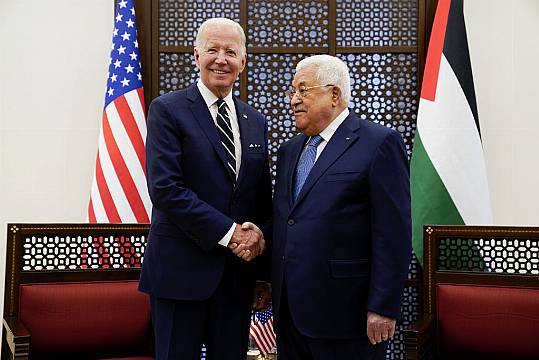President Joe Biden has acknowledged that an independent state for Palestinians “can seem so far away” as he confronted hopelessness about the stagnant peace process during a visit to the West Bank.
“The Palestinian people are hurting now. You can just feel it. Your grief and frustration. In the United States, we can feel it,” Mr Biden said during a joint appearance in Bethlehem with Palestinian Authority President Mahmoud Abbas.
Although he has announced 316 million dollars in financial assistance for the Palestinians during his visit, there is no clear path to getting peace talks back on track.
“Even if the ground is not ripe at this moment to restart negotiations, the United States and my administration will not give up on bringing the Palestinians and the Israelis, both sides, closer together,” he said.

Mr Biden said the “Palestinian people deserve a state of their own that’s independent, sovereign, viable and contiguous. Two states for two peoples, both of whom have deep and ancient roots in this land, living side by side in peace and security.”
Mr Abbas said it was time to “turn the page on the Israeli occupation on our land”. He also said Israel “cannot continue to act as a state above law”.
Mr Biden was welcomed to Bethlehem by a pair of Palestinian children, who gave him a bouquet of flowers, and a band that played the US national anthem.
Earlier in the day, he appeared at the East Jerusalem Hospital Network, which serves Palestinians, to discuss financial assistance for local healthcare.
He has proposed 100 million dollars, which requires US congressional approval, in addition to 201 million dollars for the United Nations agency for Palestinian refugees, plus smaller amounts for other assorted programmes.

Israel has also committed to upgrading wireless networks in the West Bank and Gaza, part of a broader effort to improve economic conditions.
“Palestinians and Israelis deserve equal measures of freedom, security, prosperity and dignity,” he said. “And access to healthcare, when you need it, is essential to living a life of dignity for all of us.”
When Mr Biden finished speaking at the hospital, a woman who identified herself as a paediatric nurse at another healthcare facility thanked him for the financial assistance but said “we need more justice, more dignity”.
Mr Biden’s trip to the West Bank is being met with scepticism and bitterness among Palestinians who believe he has taken too few steps toward rejuvenating peace talks, especially after President Donald Trump sidelined them while heavily favouring Israel.
The last serious round of negotiations aimed at creating an independent Palestinian state broke down more than a decade ago, leaving millions of Palestinians living under Israeli military rule.

Israel’s outgoing government has taken steps to improve economic conditions in the occupied West Bank and Gaza.
But Yair Lapid, the caretaker prime minister, does not have a mandate to hold peace negotiations, and November 1 elections could bring to power a right-wing government that is opposed to Palestinian statehood.
Meanwhile, the 86-year-old Abbas, whose Palestinian Authority administers parts of the occupied West Bank and cooperates with Israel on security, is more representative of the status quo than Palestinian aspirations.
His Fatah party lost an election, and control of Gaza, to the Islamic militant group Hamas more than 15 years ago.
He called off the first national elections since then last year — blaming Israel — when Fatah appeared to be heading for another crushing defeat. Polls over the past year have consistently found that nearly 80% of Palestinians want him to resign.
Mr Biden acknowledged this week that while he supports a two-state solution, it will not happen “in the near-term”.
The US also appears to have accepted defeat in its more modest push to reopen a Jerusalem consulate serving the Palestinians that was closed when Mr Trump recognised the contested city as Israel’s capital.
Palestinian leaders also fear being further undermined by the Abraham Accords, a diplomatic vehicle for Arab nations to normalise relations with Israel despite the continuing occupation.
Mr Biden, who heads next to Saudi Arabia to attend a summit of Arab leaders, hopes to broaden that process, which began under Mr Trump.







